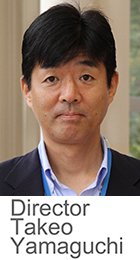About Laboratory
Message

The Laboratory for Chemistry and Life Science (CLS), Institute of Integrated Research, Institute of Science Tokyo was originally established in February 1939 as the Chemical Resource Laboratory, Tokyo Institute of Technology, funded by a donation of Professor Yogoro Kato, who contributed patent income from his work. In April 2016, as part of the University's organizational reform, it was rebranded as the Laboratory for Chemistry and Life Science (CLS). In October 2024, it has become the Laboratory for Chemistry and Life Science (CLS), Institute of Integrated Research, Institute of Science Tokyo due to the university merger with Tokyo Medical and Dental University. The CLS now boasts a history of nearly 85 years.
Our Laboratory has been the site of many significant research achievements, including the discovery of biomolecular motors by Prof. Masasuke Yoshida, and the pioneering work on conductive polymers by Prof. Hideki Shirakawa, who was awarded the Nobel Prize in Chemistry in 2000.
The mission of the Laboratory for Chemistry and Life Science is to "contribute to the advancement of human civilization and the creation of a more prosperous and sustainable society through the development of new scientific principles and next-generation science and technology, by deepening and expanding both fundamental and applied research in molecular-based chemistry and biochemistry."
Today, the demands on science and technology are broadening as society's challenges and risks evolve, driven by changes in the global environment, health, medicine, and other areas. As time progresses, the science and technology required to address these issues will also evolve, necessitating new research approaches. It is crucial to promote science and technology that anticipates future challenges while continuing to conduct advanced fundamental research. In the future, we will need to incorporate technologies from other fields, such as information technology and robotics, to remain competitive globally. This will require us to advance both fundamental and applied research, integrating new methodologies as they emerge.
At the CLS, we are conducting world-leading research in the fields of chemistry and life science, while adopting innovative approaches at the molecular level. To further advance the Laboratory's development, we have recently established five research groups: Molecular Synthesis, Molecular Materials Design, Molecular Functions, Molecular Bioscience, and Molecular Advanced Chemistry, along with around ten research teams. Each research team consists of a professor, an associate professor, and two assistant professors, all engaged in pioneering research at the global forefront.
Our faculty members are actively engaged in educating students in the Department of Chemical Science and Engineering within the School of Materials and Chemical Technology, as well as the Department of Life Science and Technology within the School of Life Science and Technology. They also contribute significantly to the University's graduate education as a whole. The Laboratory has many young faculty members in their 30s who work closely with students in their laboratories, fostering numerous research achievements together.
Since 2009, the Laboratory has been involved in the "Network Joint Research Center for Materials and Devices," a nationwide collaborative research initiative. This network includes partnerships with the Institute of Multidisciplinary Research for Advanced Materials at Tohoku University, the SANKEN at Osaka University, the Institute for Electronic Science at Hokkaido University, and the Institute for Materials Chemistry and Engineering at Kyushu University. Additionally, we are actively promoting the Alliance Project, in which these five institutes collaborate closely. Through this nationwide network of universities and research institutes, we facilitate the exchange of knowledge and human resources, leading to a broad range of research outcomes.
The Laboratory for Chemistry and Life Science will continue to advance new scientific discoveries grounded in chemistry and pursue applied research rooted in these foundations.




